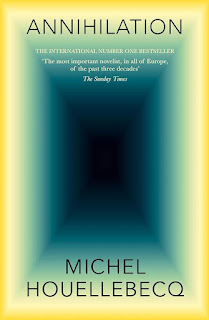I first read Houellebecq way back in the early twenty-first century, when I discovered his novel Atomised (1998) at an airport bookstore and read it on my holiday; not exactly holiday reading, but it was compelling nonetheless. Bleakly existential and darkly funny, it was also very sexy, and also, like the first time I read Murakimi (Dance Dance Dance, 1994), so startlingly fresh that I couldn't help but became an instant fan. Annihilation still contains elements of the in your face controversy and freshness of Houellebecq's earlier work, but here it is somewhat toned down, resulting in a work that comes across as serious, adult writing, focussing on universal Existential themes of what it is to be human. Annihilation reminds me of John Fowles writing, in particular his novel Daniel Martin (1977), both in terms of quality and thematic complexity. Annihilation has three main narrative strands, one focusing on the principal protagonist, Paul Raison and his family life, the second dealing with a terrorist group that posts gnomic videos and messages online, and the third dealing with the mysterious workings of French politics. All three are interrelated, with Raison working as an advisor to the French minister of finance, Bruno Juge. Juge is one of the targets of the terrorist group, who depict him as being decapitated with a guillotine in a disturbing deepfake video. Raison has personal problems related to his ailing father, his siblings and his fading marriage to his wife Prudence (she's revealed to be a vegan, a pagan and the owner of at least three pairs of hot-pants). It's an unusual blend of themes, but Houellebecq makes it work and the novel is oddly compelling, despite the prose sometimes coming across as rather flat, which may be a stylistic choice unto itself, or the translation.
Within the scope of Raison's family life Houellebecq explores the problematic moral and practical concerns of the care given to the aged and infirm, with his retired father having suffered a major stroke that leaves him paralysed. Houellebecq critiques the West's flawed attitudes to age and death, both in terms of how the State deals with it, and how individuals deal with it within the West's spiritual and religious vacuum. Raison's sister, Cecile, is a Christian, and her beliefs and coping mechanisms are used to highlight the opposing secular attitudes of her brother (in the end, Christianity is shown as not really being of much use...). Raison's relationship with his wife is at the heart of some of the novel's most positive and heartwarming moments. Houellebecq, it seems, is fully prepared to explore redemption within a romantic relationship, which, given what usually happens in his other novels, comes as somewhat of a shock. Indeed, the terms positive and heartwarming would not have been used in any reviews as descriptors of his previous work. But within the novel's narrative framework it works well and you can't help but be happy for the married couple, although, of course they are eventually confronted with some of life's most bleakest and inevitable outcomes. Paul and Prudence's relationship also contains some of Houellebecq's trademark sexual frankness, with Prudence being described in one extended scene as being almost permanently up for it, while also administering sexual favours that last for hours. It almost makes one long to be married. Meanwhile the matter of the terrorists is not fully resolved, which surprised me, but perhaps it is just like the other events in the novel, both the personal and the political - just another thing that happens in the black theatre of life, running along in the background, oblivious to the triumphs and tragedies of human life. Annihilation of one of Houellebecq's most satisfying and fascinating novels', if you are new to his writing it is perhaps best to start elsewhere, but ultimately it stands as one of his best.


